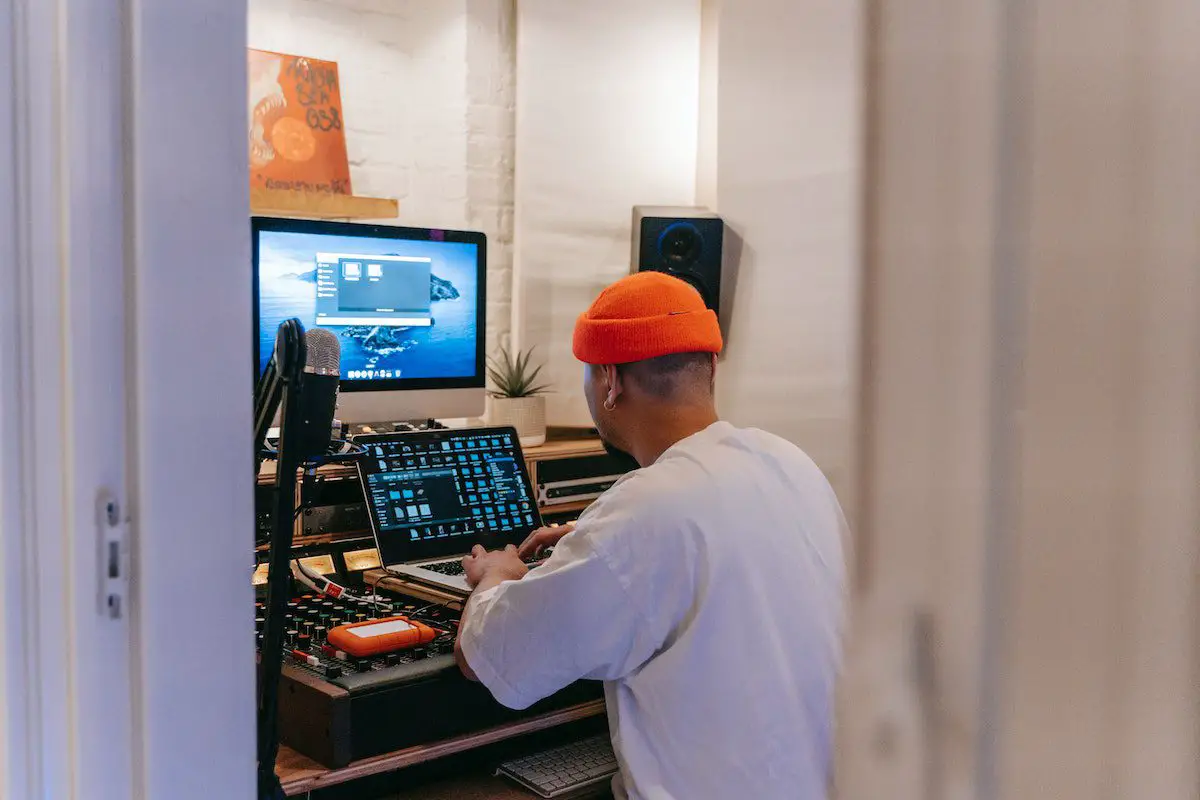When we listen to a song, we often marvel at how each element seamlessly blends together, creating a sound that’s harmonious, balanced, and pleasing to the ears. But have you ever wondered how this intricate balance is achieved? Well, the answer lies in a critical process in audio production known as “mastering.” So, what exactly is mastering? By the end of this blog post, you’ll get a grasp on its fundamentals and gain insight into techniques used by the pros.
What is mastering? Mastering is the final step in music production, where the mix is processed and optimized for distribution, ensuring a consistent and balanced sound across all playback systems.
What is mastering in audio production?
Mastering is the final step in the audio production process. It refines and optimizes a track for distribution by ensuring it will sound its best on all types of playback devices, from stereo systems to headphones. This stage involves a series of adjustments such as equalization, compression, and limiting to balance the frequencies and manage the dynamic range of the audio.

The goal of mastering is to enhance the sonic elements of a mix while correcting any mix balance issues and enhancing the overall listening experience.
The goal of mastering is to enhance the sonic elements of a mix while correcting any mix balance issues and enhancing the overall listening experience. Additionally, it ensures consistency and cohesion across an album or a collection of tracks. The mastering process, carried out by a skilled mastering engineer, gives the final polish to a track, preparing it for public release.
AKAI Professional MPK Mini MK3

AKAI Professional MPK Mini MK3
Why is mastering essential for music production?
Mastering ensures your tracks sound their absolute best before they hit the airwaves or streaming platforms, given that music is now being listened to on a wider variety of formats and devices than ever before. Without mastering, your tracks might sound off-balance, with inconsistent levels, or even muffled in some cases.
Let’s take a beat you just produced. Your mix sounds amazing on your studio monitors, but when you play it on your buddy’s car speakers, the bass is boomy, and the vocals are too quiet. That’s where mastering comes in—balancing and optimizing your mix to sound great on any playback system. So, whether you’re bumpin’ in the club or groovin’ in your living room, a well-mastered track keeps the vibe alive.
How does mastering differ from mixing?
It’s easy to get mixing and mastering confused, especially if you’re just starting in the music production world. Think of mixing as cooking up a delicious meal, while mastering is like putting the finishing touches on your gourmet creation.
During the mixing phase, you’ll work on blending all the individual elements of your track—the vocals, instruments, drums, and effects—into a cohesive whole. You’ll adjust levels, pan elements, apply EQ, and add compression, among other things. Mixing is where you craft the overall sonic balance and create space for each sound to shine.

Mastering, on the other hand, is the final polish that takes your carefully crafted mix and optimizes it for various playback systems and formats. This step involves applying subtle EQ adjustments, multi-band compression, limiting, and even some stereo-imaging enhancements. The goal here is to make your track sound consistent and balanced across different listening environments and devices.
Suppose you’re working on a dope hip-hop track with heavy 808s, snappy snares, and smooth vocals. During the mixing stage, you’d focus on getting the perfect balance between these elements, making sure the 808s don’t overpower the vocals and the snare cuts through the mix.
Once you’re happy with the mix, you’d move on to mastering, where you’d fine-tune the overall sound, ensuring it translates well on everything from a massive club sound system to your grandma’s vintage radio. In short, mixing is all about the ingredients, while mastering is the secret sauce that ties everything together.
What are the key elements of a successful mastering process?
Now that we’ve covered the basics of mastering and how it differs from mixing, let’s explore the key elements that contribute to a successful mastering process.
- Equalization (EQ): EQ is one of the core components of mastering. It’s used to subtly adjust the tonal balance of your mix, fixing any frequency imbalances or issues that might have been overlooked during the mixing stage. For example, you might use EQ to gently boost the highs for added clarity or reduce muddiness in the low mids.
- Compression: In mastering, compression is applied to help control the overall dynamic range of your track. This ensures a more consistent listening experience across various playback systems. Be careful, though—over-compression can squash the life out of your mix, so use it with a gentle touch.
- Limiting: A limiter is used in the mastering process to boost the overall loudness of your track without causing distortion or clipping. This step helps your track compete with other commercial releases in terms of loudness while still retaining its dynamic range.
- Stereo Imaging: Enhancing the stereo image of your mix can add depth, space, and dimension to your music. However, it’s important to be cautious with stereo imaging adjustments, as overdoing it may cause phase issues and other problems when your track is played on mono systems.
- Reference Tracks: When mastering, it’s crucial to compare your track to other professionally mastered songs in the same genre. This can help you identify any issues with your mix and guide you toward achieving a similar level of quality and polish.
How should you master your music for streaming platforms?
Mastering your music for streaming platforms involves understanding the unique technical requirements and specifications of each platform. Here’s what you need to consider:
- Understand loudness normalization: Different platforms use different measures of loudness for normalization (usually in LUFS) to provide a consistent listening experience. For instance, Spotify normalizes tracks at -14 LUFS, while Apple Music uses -16 LUFS. Consider these standards to ensure your music isn’t turned down.
- Avoid clipping and distortion: The encoding and compression used by streaming platforms can sometimes cause a track to clip or distort. To avoid this, leave enough ‘headroom’ during mastering. A good rule of thumb is to aim for a True Peak level of -1.0 dBTP.
- Consider the bit-rate and codec: Each streaming platform uses specific codecs (like Ogg Vorbis for Spotify or AAC for Apple Music) and bit-rates, which can affect how your music sounds. Always submit the highest quality master file you can. A high-resolution file, such as 24-bit WAV, gives the streaming services the most information to work with when they convert it to their codec.
- Check mono compatibility: Many listeners use devices that output in mono rather than stereo, so check your mixes in mono to ensure they still sound good.
- Metadata: Include all relevant metadata like the track name, artist name, and ISRC codes during the mastering process. This information is critical for categorizing your music correctly on the platform and for royalty payments.
If you want even more tips and insights, watch this video called “Mastering Start To Finish: A Step by Step Guide to Loud and Clear Masters” from the In The Mix YouTube channel.
Frequently asked questions (FAQ)
Do you still have questions about mastering? Below are some of the most commonly asked questions.
How long does it typically take to master a track?
The time it takes to master a track can vary depending on the complexity of the mix and the engineer’s experience. Generally, it can take anywhere from a few hours to a couple of days for a professional engineer to master a single track.
Can I master my own tracks, or should I hire a professional mastering engineer?
While it’s possible to learn the basics of mastering and apply them to your own tracks, working with a professional mastering engineer can provide a fresh perspective and ensure your music achieves a higher level of polish. As your skills and experience grow, you may feel more comfortable mastering your own tracks.
Is it necessary to master my tracks if I only plan to share them online?
Even if you’re only sharing your music on platforms like SoundCloud or YouTube, mastering is still important to ensure your tracks sound their best across various devices and playback systems. A well-mastered track can help you stand out from the crowd and make a lasting impression on listeners.
Conclusion
Mastering is a vital step in the audio production process that elevates the quality and impact of a recording. So, did I answer all your questions about mastering? Let me know in the comments section below—I read and reply to every comment. If you found this article helpful, share it with a friend, and check out my full blog for more tips and tricks on audio production. Thanks for reading!
Key Takeaways
This article covered the mastering process in music production. Here are some key takeaways:
- Mastering is the final step in music production that optimizes the mix for various playback systems and formats.
- Mastering differs from mixing in that it focuses on fine-tuning the overall sound while mixing is about blending individual elements.
- Key elements of a successful mastering process include EQ, compression, limiting, stereo imaging, and reference tracks.
- Mastering ensures a consistent and balanced sound, making it essential for music production.















